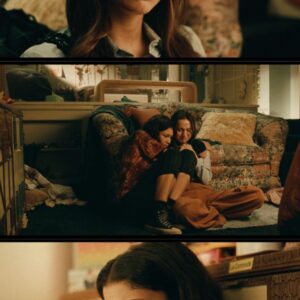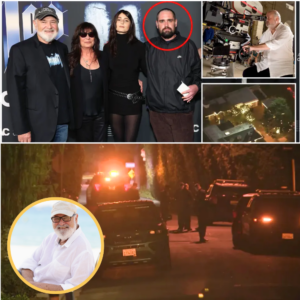As the leaves turn crimson and the evenings draw in with that crisp bite of impending frost, there’s nothing quite like curling up with a story that warms the soul like a forgotten hot toddy. Enter Film Club, the BBC’s sparkling new six-part romantic comedy-drama that’s just hit screens, promising to be the ultimate binge for anyone nursing a case of seasonal melancholy. Co-created and penned by Sex Education and The White Lotus breakout Aimee Lou Wood in her screenwriting debut, the series stars Wood herself alongside heavy-hitters Suranne Jones, Nabhaan Rizwan, and fresh-off-an-Emmy wunderkind Owen Cooper. Dropping all episodes on BBC iPlayer at the crack of dawn on October 7, 2025, with the first two airing on BBC Three that evening, Film Club arrives like a serendipitous plot twist in our own lives—just when the world feels a tad too scripted in shades of gray.
At its heart, Film Club is a love letter to the awkward alchemy of friendship, family, and those celluloid dreams that make us believe in second acts. Wood plays Evie, a twenty-something graphic designer who’s hit the emotional brakes hard after a “wobble”—that gloriously vague euphemism for the kind of quarter-life crisis that leaves you marinating in your childhood bedroom for six months straight. Evie’s sanctuary? Not a therapist’s couch, but her mum’s cluttered garage, transformed weekly into a makeshift cinema for the titular Film Club. This ragtag crew of cinephiles—decked out in whatever era’s wardrobe the night’s flick demands—gathers to dissect rom-com tropes, horror heartbreaks, and everything in between. It’s here, amid fairy lights strung like hopeful constellations and popcorn bowls overflowing with nostalgia, that Evie finds her rhythm. Or at least, she does until Noa (Rizwan), her best mate and platonic soulmate, drops a bombshell: a dream graphic design gig that’s whisking him to the other side of the country. Suddenly, the unexamined comfort of their will-they-won’t-they stasis is upended, forcing Evie to confront if their bond is the stuff of fade-to-black friendship or full-blown cinematic romance.
Wood’s script, co-written with Ralph Davis—who also pops up as Dominic, the club’s enigmatic new recruit—pulses with the kind of punchy, self-aware wit that feels like eavesdropping on a late-night WhatsApp thread among your sharpest friends. “We’ve been tinkering with this for a decade,” Wood revealed in a recent chat, her eyes lighting up like the glow of a projector reel. “It’s messy, it’s real, and it’s got that spark of ‘what if’ that every good film needs.” The series doesn’t shy away from the thorny bits of modern love: the terror of vulnerability after burnout, the quiet ache of watching someone you adore slip away, and the hilarious absurdity of trying to adult when your inner teenager still wants to rewind the bad parts. Episode four, helmed by Killing Eve scribe Anna Jordan, reportedly dials up the drama with a plot pivot that has insiders buzzing about “tears and triumphs in equal measure.” At just 30 minutes per episode, it’s paced like a perfectly edited montage—snappy enough for a rainy afternoon marathon, substantial enough to leave you pondering your own half-baked happily-ever-afters.
What elevates Film Club from charming indie flick to must-see event is its ensemble, a dream team that’s equal parts star power and fresh faces. Suranne Jones, the Manchester powerhouse who’s slayed as everything from the steely submarine sleuth in Vigil to the unapologetically audacious Anne Lister in Gentleman Jack, brings her signature ferocity softened with fierce tenderness to Suz, Evie’s single mum. Suz is the eccentric matriarch who runs her home like a benevolent dictatorship: think fairy cakes baked at midnight, unsolicited life advice delivered over cups of Tetley, and a garage cinema that’s seen more costume changes than a West End wardrobe department. “Aimee’s script had me in stitches and then straight to sobs,” Jones gushed at a recent London screening. “Suz is that mum we all need—flawed, fabulous, and utterly devoted. Playing her felt like coming home.” Her chemistry with Wood crackles with the easy intimacy of real-life confidantes, turning mother-daughter spats into scenes that hit like a gut-punch of recognition.
Then there’s Nabhaan Rizwan as Noa, the effortlessly cool graphic artist whose quiet charisma masks a well of unspoken longing. Fresh from his magnetic turn as the hapless god Dionysus in Kaos and the tense undercover operative in Informer, Rizwan infuses Noa with a lived-in charm that’s catnip for rom-com devotees. He’s the guy who quotes When Harry Met Sally unironically, sketches Evie’s wild ideas into reality, and harbors feelings so obvious only they can’t see it. Their dynamic—playful banter laced with those charged silences—echoes the slow-burn magic of Before Sunrise, but transplanted to a Manchester suburb where the skyline’s more terraced houses than Eiffel Tower. “Noa’s journey is about daring to rewrite your own story,” Rizwan shared, hinting at subplots involving family expectations and the immigrant hustle that add layers of cultural nuance to the fluff.
Stealing scenes in a breakout role that’s already got awards chatter humming is Owen Cooper, the 15-year-old phenom whose blistering debut in Netflix’s Adolescence—a raw gut-punch of a drama about toxic masculinity and social media’s dark underbelly—netted him a record-setting Emmy earlier this year. At just 15, Cooper’s the youngest winner in the supporting actor category, a feat that’s drawn comparisons to a young Jodie Foster storming the gates. In Film Club, he plays Callum, the infuriatingly cheeky neighbor kid who’s equal parts pest and pint-sized philosopher. Picture a mop-topped mischief-maker who blasts grime from his bedroom window at 2 a.m., crashes Film Club uninvited with contraband sweets, and delivers deadpan wisdom that cuts through the adults’ pretensions like a hot knife through clotted cream. “Owen’s a force,” director Catherine Morshead (The Full Monty, Daddy Issues) raved during production. “He brings this unfiltered energy that’s pure joy—reminds us why we fell in love with stories in the first place.” It’s Cooper’s first post-Emmy gig, and whispers from the set suggest his improvised riffs with Wood had the crew in hysterics, turning scripted zingers into instant classics.
Rounding out the family circus are Liv Hill as Izzie, Evie’s eye-rolling younger sister navigating her own teen turbulence—think The Serpent Queen‘s scheming Marie de’ Medici reimagined as a TikTok-savvy sibling—with a vulnerability that tugs at the heartstrings. Adam Long (Happy Valley, Masters of the Air) charms as Josh, the boyfriend who’s all steady reliability but zero cinematic flair, providing the perfect foil to Noa’s brooding allure. And keep an eye on Kai Assi as Ziggy, Callum’s sidekick in suburban shenanigans, whose wide-eyed innocence injects doses of unadulterated whimsy.
Behind the lens, Film Club is a testament to British TV’s knack for turning the everyday into enchantment. Directed by Morshead, whose work on Doctor Foster and Gold Digger proves her mastery of domestic dynamite, the series was shot over eight weeks in Greater Manchester last spring. The garage set, a labyrinth of fairy lights, mismatched deck chairs, and shelves groaning under VHS tapes and Blu-rays, doubles as a character—cozy yet claustrophobic, a bubble where dreams are screened but realities intrude. Cinematographer Matt Wicks bathes scenes in that golden-hour glow of autumn evenings, while Nathan Klein’s score weaves indie-folk strums with swelling strings, evoking the ache of Garden State crossed with the uplift of Love Actually. Produced by Gaumont UK (the minds behind Lupin and Obsession) with support from ZDFneo in Germany, it’s executive produced by Wood herself alongside Alison and Jamie Jackson, with BBC’s Nawfal Faizullah ensuring the youth pulse beats strong for BBC Three and iPlayer.
The road to Film Club‘s premiere has been a decade in the making, born from late-night scribbles between Wood and Davis during lulls on other sets. Commissioned in February 2024 by BBC Drama chief Lindsay Salt and Fiona Campbell, controller of Youth and iPlayer, it landed amid a wave of actor-turned-writer triumphs—think Phoebe Waller-Bridge’s Fleabag or Michaela Coel’s I May Destroy You. Wood, 30 and riding high from her BAFTA-winning Sex Education run as the irrepressible Aimee and her scene-stealing White Lotus Season 3 stint, has long hinted at her literary ambitions. “Acting’s my first love, but writing’s the one that keeps me up at night,” she confessed at the Edinburgh TV Festival. Davis, whose House of the Dragon dragon-riding and Big Boys bromance roles showcase his range, brings a bloke-ish humor that grounds the rom-com beats in relatable realism. Their partnership—forged in the trenches of fringe theater and Zoom drafts—shines through in scripts that laugh at love’s absurdities without mocking its pains.
As October 7 dawned, social feeds exploded with trailer reactions: X (formerly Twitter) trended #FilmClubBinge under a hail of heart-eyes emojis and “This is my emotional support series” proclamations. Fan edits mashed Noa and Evie’s meet-cutes with Notting Hill clips, while Cooper’s Callum quips spawned a meme storm rivaling his Adolescence viral moments. Critics’ early peeks? Ecstatic. “A fizzy tonic for the rom-com soul—Wood’s voice is a revelation,” raved The Guardian‘s preview. Variety dubbed it “the autumn equivalent of a pumpkin spice latte: sweet, spicy, and impossible to quit after one sip.” With global streaming via BBC iPlayer’s international arm, it’s poised to charm far beyond Blighty, tapping into that universal itch for stories where the underdog gets the grand gesture.
In a TV landscape bloated with high-stakes thrillers and dystopian dread, Film Club dares to be deliciously low-key—a reminder that the best romances unfold not in ballrooms or battlefields, but in the flickering light of shared screens and stolen glances. It’s about the films we watch to escape, and the ones we live that surprise us most. For Wood, it’s a milestone: actress, writer, producer, all in one gloriously messy package. For viewers, it’s permission to hit play, dim the lights, and let the credits roll on whatever plot twist life threw your way. Dearest romantics, the garage door’s open. Step inside, grab the popcorn, and let the binge begin. Who knows? Your own reel might just find its perfect edit.

